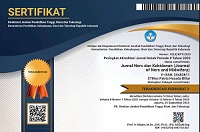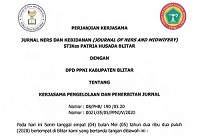Kesediaan Vaksinasi HPV pada Remaja Putri Ditinjau dari Faktor Orang Tua
DOI:
https://doi.org/10.26699/jnk.v7i2.ART.p213-222Keywords:
HPV, Remaja, Dukungan, Sikap, KepercayaanAbstract
Infeksi HPV dan pre kanker serviks (sel-sel abnormal pada leher rahim yang dapat menyebabkan kanker) telah menurun secara signifikan sejak vaksin HPV digunakan.Cakupan vaksinasi HPV masih rendah di Indonesia.Orang tua adalah pemegang tanggung jawab dan kewajiban utama di dalam penjaminan pemenuhan hak dasar anak untuk mendapatkan vaksinasi. Tujuan penelitian adalah untuk mengetahui faktor yang berhubungan (sikap, kepercayaan, dukungan orang tua) dengan kesediaan vaksinasi pada remaja putri. Jenis penelitian adalah survey analitik dengan pendekatan cross sectional. Penelitian dilaksanakan di SD Muhammadiyah Macanan, Ngemplak dan SMPN 1 Berbah, Sleman pada Mei-Juli 2019. Jumlah sampel 127 remaja putri beserta orang tuanya dipilih dengan accidental sampling. Instrumen kuesioner dan telah dilakukan uji validitas. Analisis bivariat dengan uji chi square (dukungan instrumen, emosional, kepercayaan orang tua) dan uji fisher exact (dukungan informasi dan sikap). Hasil penelitian menunjukkan 92,9% orang tua tidak memberikan dukungan informasi, 85% tidak memberikan dukungan instrumen, 75,6% memberikan dukungan emosional kepada putrinya terkait vaksinasi. Faktor yang berhubungan dengan kesediaan vaksinasi adalah dukungan instrumen (p-value = 0,048). Faktor yang menjadi pertimbangan terbanyak orang tua untuk mengijinkan anaknya di vaksinasi adalah keamanan vaksin (81,1%). Kesimpulan: Ada hubungan dukungan instrumen orang tua dengan kesediaan vaksinasi HPV pada remaja putri.
Â
HPV infections and cervical precancers (abnormal cells on the cervix that can lead to cancer) have dropped significantly since HPV vaccine has been in use.
HPV vaccination coverage is still low in Indonesia. Parents are the main responsibility and obligation in guaranteeing the fulfillment of the child's basic rights to get a vaccination. The purpose of this study was to determine the related factors (attitudes, beliefs, parental support) with the willingness to participate in HPV vaccination among adolescent girls. This type of the study was analytic survey with cross sectional approach. The study was conducted at SD Muhammadiyah Macanan, Ngemplak and SMPN 1 Berbah, Sleman in May-July 2019. The sample was 127 adolescent girl and their parents selected by accidental sampling. The instrument used questionnaire and already undergone validity test. The bivariate analysis used chi square test (instrument and emotional support, parental trust) and fisher exact test (information support and attitude). The results showed 92.9% of parents did not provide information support, 85% did not provide instrument support, 75.6% provided emotional support to their daughters related to vaccination. Factors related to the willingness of vaccinations were instrument support (p-value = 0.048). The factor that was considered by most parents to allow their children to be vaccinated was vaccine safety (81.1%). Conclusion: There was a correlation between parental instrument support and HPV vaccination willingness of adolescent girls.
References
Adesina, K. T., Saka, A., Isiaka-lawal, S. A., Omotayo, O., Gobir, A., Olarinoye, A. O., & Ezeoke, G. G. (2018). Knowledge , Practice and Acceptability of HPV Vaccine by Mothers of Adolescent Girls in. Sudan Journal of Medical Sciences, 13(1), 33–49. https://doi.org/10.18502/sjms.v13i1.1687
Adesina, K. T., Saka, A., Lawal, S. A. I., Adesiyun, O. O., Gobir, A., Olarinoye, A. O., & Ezeoke, G. G. (2018). Parental perception of human papillomavirus vaccination of prepubertal girls in Ilorin , Nigeria. Saudi Journal for Health Sciences, 7(1), 65–70. https://doi.org/10.4103/sjhs.sjhs
Ajzen, I. (1991). The Theory of Planned Behavior. Organizational Behavior and Human Decision Process, 50, 179–211.
Anna B, Melinda K, Kimberly L, Anne F. Rositch. (2018). Reasons for Lack of HPV Vaccine Initiation in NIS-Teen Over Time: Shifting the Focus From Gender and Sexuality to Necessity and Safety. Journal of Adolescent Health, 63(5):652.doi: 10.1016/j.jadohealth.2018.06.024
Arifah, K., Damayanti, W., & Sitaresmi, M. N. (2017). Kesediaan Mendapat Vaksinasi Human Papilloma Virus pada Remaja Putri Di Yogyakarta. Sari Pediatri, 18(6), 430–435.
Azwar S (2013). Sikap Manusia: Teori dan Pengukurannya. Yogyakarta: Pustaka Pelajar
Blumenthal, J., Frey, M. K., Jr, M. J. W., Tchabo, N. E., Soren, K., & Slomovitz, B. M. (2012). Adolescent Understanding and Acceptance of the HPV Vaccination in an Underserved Population in New York City. Journal of Oncology, 1–8. https://doi.org/10.1155/2012/904034
Bruni, L., Diaz, M., Barrionuevo-rosas, L., Herrero, R., Bray, F., Bosch, F. X., Sanjosé, S. De, & Castellsagué, X. (2016). Articles Global estimates of human papillomavirus vaccination coverage by region and income level : a pooled analysis. THE LANCET Global Health, 4(July), 453–463. https://doi.org/10.1016/S2214-109X(16)30099-7
Calo, W. A., Gilkey, M. B., Shah, P. D., Moss, J. L., Noel, T., Hill, C., Pilgrim, H., Care, H., Hill, C., & Hill, C. (2016). Parents’ Support for School-Entry Requirements for Human Papillomavirus Vaccination: A National Study. Cancer Epidemiol Biomarkers Prev, 25(9), 1317–1325. https://doi.org/10.1158/1055-9965.EPI-15-1159.Parents
CDC (2020). HPV Vaccine Safety and Effectiveness. Internet: https://www.cdc.gov/vaccines/vpd/hpv/hcp/safety-effectiveness.html. Diakses pada 17 Maret 2020
Christine, A; Putra, A. E. (2013). Penerimaan Vaksinasi Kanker Serviks Pada Siswi SMA Di Kabupaten Badung Tahun 2012. Community Health, I(2), 54–64.
Dethan, C. M., Luh, N., & Suariyani, P. (2017). PENGETAHUAN DAN SIKAP TENTANG PERILAKU VAKSINASI HPV PADA SISWI SMA SWASTA. MKMI, 13(2), 167–175.
Diane, E, dkk (2009). Human Development, Perkembangan Manusia edisi 10. Jakarta: Salemba Humanika
Fatwa Majelis Ulama Indonesia Nomor 4 Tahun 2016 tentang Imunisasi
Fernández, M. E., Le, Y. L., Fernández-espada, N., Aragon, A. P., & Colón-lópez, V. (2014). Knowledge , Attitudes , and Beliefs About Human Papillomavirus ( HPV ) Vaccination Among Puerto Rican Mothers and Daughters , 2010 : A Qualitative Study. Preventing Chronic Disease Public Health Research, Practice and Policy, 11(E212), 1–8.
Fitriani, Y., Mudigdo, A., & Andriani, R. B. (2018). Health Belief Model on the Determinants of Human Papilloma Virus Vaccination in Women of Reproductive Age in Surakarta , Central Java. Journal of Health Promotion and Behavior, 3, 16–26. https://doi.org/https://doi.org/10.26911/thejhpb.2018.03.01.02
Friedman. (2013). Keperawatan Keluarga. Yogyakarta: Gosyen Publishing
Ganczak, M., Owsianka, B., & Korze, M. (2018). Factors that Predict Parental Willingness to Have Their Children Vaccinated against HPV in a Country with Low HPV Vaccination Coverage. International Journal of Environmental Research and Public Health, 15, 1–13. https://doi.org/10.3390/ijerph15040645
Gattegno, M. V, Vertamatti, M. A. F., Bednarczyk, R. A., & Evans, D. P. (2019). A cross-sectional survey of parental attitudes towards Human papillomavirus vaccination exclusion categories in Brazil. BMC International Health and Human Rights, 19(6), 1–9.
Karneli, N. K., Suwiyoga, K., Sudibya, A., (2013). Kesediaan membayar vaksinasi kanker serviks di sekolah menengah umum Kabupaten Badung. Public Health and Preventive Medicine Archive, 1(1), 70–77.
Kepmenkes RI Nomor HK.02.02/Menkes/489/2016 Tentang Pelaksanaan Pemberian Imunisasi Human Papilloma Virus di Provinsi Daerah Khusus Ibu Kota Jakarta dan Daerah Istimewa Yogyakarta
Lee, K., Chang, K. H., Cho, S., Park, S., & Park, S. T. (2017). Attitudes Regarding HPV Vaccinations of Children among Mothers with Adolescent Daughters in Korea. The Korean Academy of Medical Sciences, 32, 130–134.
Newman, P. A., Logie, C. H., Lacombe-duncan, A., Baiden, P., Tepjan, S., Rubincam, C., Doukas, N., & Asey, F. (2018). Parents ’ uptake of human papillomavirus vaccines for their children : a systematic review and meta- analysis of observational studies. BMJ Open, 1–15. https://doi.org/10.1136/bmjopen-2017-019206
Peraturan Menteri Kesehatan Republik Indonesia Nomor 12 Tahun 2017 tentang Penyelenggaraan Imunisasi
Rachmani, B., Shaluhiyah, Z., & Cahyo, K. (2012). Sikap Remaja Perempuan Terhadap Pencegahan Kanker Serviks Melalui Vaksinasi HPV di kota Semarang. Media Kesehatan Masyarakat Indonesia, 11(1), 34–41.
Rokom (2017). Peran Keluarga Sangat Dibutuhkan untuk Penuhi Hak Imunisasi bagi Anak. Internet:http://sehatnegeriku.kemkes.go.id/baca/rilis-media/20170426/1620675/peran-keluarga-sangat-dibutuhkan-penuhi-hak-imunisasi-bagi-anak-2/. Diakses pada Februari 2020
Rosenstock, I. M. (1974). The Health Belief Model and Preventive Health Behavior. Health Education Monographs, 2(4), 354–386. https://doi.org/10.1177/109019817400200405
Santrock, J (2013). Life Span Development: Perkembangan Masa Hidup. Jakarta: Erlangga
Sari, A. P., & Syahrul, F. (2014). Faktor yang berhubungan dengan tindakan vaksinasi hpv pada wanita usia dewasa. Jurnal Berkala Epidemiologi, 2(3), 321–330.
Tang, S. Y., Liu, Z. H., Li, L., Cai, H. L., & Wan, Y. P. (2014). Awareness and knowledge about human papillomavirus among high school students in China. The Journal of reproductive medicine, 59(1-2), 44–50.
WHO (2017). Safety update of HPV vaccines. Internet:https://www.who.int/vaccine_safety/committee/topics/hpv/June_2017/en/ diakses tanggal 1 September 2019
WHO (2018). Human papillomavirus (HPV). Internet:https://www.who.int/immunization/diseases/hpv/en/. Diakses pada Januari 2020.
Wong, C. K. H., Man, K. K. C., Ip, P., Paed, F., Paed, F., Kwan, M., Paed, F., Paed, F., & Mcghee, S. M. (2018). Mothers ’ Preferences and Willingness to Pay for Human Papillomavirus Vaccination for Their Daughters : A Discrete Choice Experiment in Hong Kong. Value in Health, 21(5), 622–629. https://doi.org/10.1016/j.jval.2017.10.012
Zhang, S., Pan, X., Wang, S., Yang, C., & Gao, X. (2013). Perceptions and acceptability of HPV vaccination among parents of young adolescents : A multicenter national survey in China. Vaccine, 31(32), 3244–3249. https://doi.org/10.1016/j.vaccine.2013.05.046
Downloads
Published
How to Cite
Issue
Section
License
Copyright (c) 2020 Jurnal Ners dan Kebidanan (Journal of Ners and Midwifery)

This work is licensed under a Creative Commons Attribution-ShareAlike 4.0 International License.






